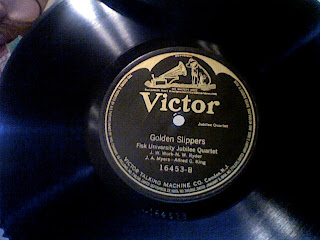"Hear de Lambs a Crying" by Roland Hayes (Columbia Masterworks 69812-D)
What’s your dream? What if you could accomplish anything you set your mind to? What if fear was out of the picture?
Roland Hayes was born in Curryville, Georgia (Gordon County, near Calhoun), on June 3, 1887. His parents were former slaves, and Roland was raised in the heyday of the Jim Crow South, when racism and ignorance reigned supreme. The odds, as it were, were stacked against him, especially since his father died when Roland was at a young age. The future did not look promising by any stretch of the imagination for a young black boy from Georgia.
But he could sure sing.
Hayes’ family moved to Chattanooga when he was eleven. Despite all the hardships encountered, Roland received vocal training and was able to attend the prestigious Fisk University, a historically black school in Nashville. He toured with the world-famous Fisk Jubilee Singers while attending there. Afterwards, he studied in London, he performed at Carnegie Hall, toured Europe and the United States numerous times, and sang with the Boston Symphony Orchestra… just to name a few of his accomplishments. Hayes was one of the highest paid singers in the world at the time, and the first African-American to achieve international notoriety in the field of classical music. Often noted for his remarkable linguistic skills, he could sing in English, French, Italian, and German. The concert hall in the UTC Fine Arts Center bears his namesake.
So what pushes a man from such low depths to such great heights? Passion, I believe. Yes a passion for music, but something much more than that. Passion for life. An almost obsessive drive to see the odds shifted and one’s world bettered. A belief that anything is possible, and a refusal to settle for the status quo. Roland Hayes is a stunning and inspiring example, not just to musicians, but to anyone who was ever afraid to do something.
This love for life and justice shines through on Hayes’ recording for Columbia Records, titled “Hear de Lambs a Crying”. This song is Roland’s arrangement of the traditional spiritual of the same title. Hayes’ brilliant tenor voice, coupled with the dark and exiguous piano stylings of Reginald Boardman, make for an intense and heart-wrenching spiritual experience. In the song, Jesus asks Peter, “You hear the lambs a crying?” Jesus then answers his own question with the command, “Shepherd, feed my sheep.” I believe that Roland Hayes saw the condition of his people, harassed and oppressed, and took those words to heart. You can hear it in his voice as he sings. Roland decided (perhaps even subconsciously) that something needed to be done. He had music, so that’s what he ran with. He did what he could, with what he had, where he was. And soon enough, he had turned the tables of racial stereotypes. He became the shepherd, helping to lead the lambs to greener pastures.
A Georgia state historic marker says this of Roland Hayes:
“He is and ever was at once one voice, one race, one citizen, one triumph in belief, one compromise with nothing… he is a country to himself that borders not on nations whole or sundered, but on art, on life- on people prizing now and then nobility in man.”
So as you listen to this piece (along with the contrasting “Plenty Good Room” that appears on the same side), think about what it is that you can do to make your world a better place, using what you do. You may not become a world class tenor vocalist like Roland Hayes, but you don’t have to. Whatever you do, big or small, is just as important. Just do it, and make sure it comes from you.





